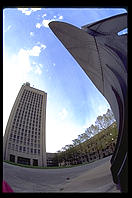

|
School Daysof Philip Greenspun |

Paul Graham explains how schools where learning is secondary devolve
into savagery in "Why Nerds are Unpopular".

 After passing an entrance examination, I
started at MIT in 1979. People sometimes wonder how I got into MIT
without a high school diploma; I tell them that I had a football
scholarship. Anyway, I'm hoping to get my bachelor's degree very soon
now.
After passing an entrance examination, I
started at MIT in 1979. People sometimes wonder how I got into MIT
without a high school diploma; I tell them that I had a football
scholarship. Anyway, I'm hoping to get my bachelor's degree very soon
now.
Note: After 20 years, I've discovered only two great books about MIT. One is The Idea Factory, Pepper White's chronicle of graduate school. The other is a wicked satire by A.R. Gurney, the famous playwright, who happens also to have been an MIT humanities professor. He wrote Entertaining Strangers, a novel about a WASP-y MIT humanities professor surrounded by Jews in the humanities department, having to sit in faculty meetings behind science profs with Nobel prizes and engineering profs with $millions from their high-tech companies.
Speaking of MIT undergraduate education, I'm alarmed by the rising cost
of tuition and have a plan for making
MIT tuition-free. Whether or not we make kids pay tuition, I have
to admit that our graduation ceremony is inspiring, as I hope you'll
agree if you view
my photos of MIT's 1998 graduation.
 Here's my theory on the progression of John Q. Nerd's mood through
graduate school. John is working at IBM in the knob division. He is
making $55,000/year but is bored. "I hate this job. I feel so
narrow. I only ever talk to the four other guys in the knob division
and all I get to design are knobs. I'm quitting and going back to
grad school so that I can feed my curious mind."
Here's my theory on the progression of John Q. Nerd's mood through
graduate school. John is working at IBM in the knob division. He is
making $55,000/year but is bored. "I hate this job. I feel so
narrow. I only ever talk to the four other guys in the knob division
and all I get to design are knobs. I'm quitting and going back to
grad school so that I can feed my curious mind."
We interview Mr. Nerd after two years of grad school. How does he like it? "Fabulous," John Q. replies. "Graduate school is everything I ever dreamed it would be and more. I've taken 10 classes in the last two years and worked with about 50 different people. Every day I talk to a dozen folks. I think about problems in all kinds of areas. I can't believe those chumps who stayed at IBM."
We come back to visit John in his sixth year of grad school. "Boy do I miss my old job at IBM," he sighs. "At IBM I actually got to talk to four other people every day. Here, I've spent the last two years alone in my office working on my PhD thesis. At IBM, I got to design all kinds of knobs. On/off knobs. Screen brightness knobs. Display alignment knobs. It was really challenging and diverse. Now all I do is work on my thesis topic: 'Optimal knurling patterns for volume control knobs.'"
In short, the only person who could possibly be happy in the thesis-writing portion of grad school is the kind of person who never would have been lured from his comfortable engineering job in the first place.
It took me awhile to figure this out. I'm not sure what to do with it
because my days
are so busy.

Professor Pamela Karlan's reading list included Torture and Plea Bargaining [Langbein]. The paper recounted the history of torture. The Catholic Church decided in the Middle Ages that too many people were getting convicted of crimes that they hadn't committed. They instituted a rule that said nobody could be convicted without either two eyewitnesses or a confession. Convictions became difficult to obtain. Since it was not possible to obtain extra witnesses, the Church decided to torture defendants until they confessed.
Today we have a legal system with many safeguards for defendants' rights. However, in our heart of hearts, we don't really believe that we could convict enough defendants if we actually gave all of them all of their rights. Consequently, we set nominal penalties for crimes at absurdly high levels, e.g., "life plus 100 years." The actual penalty received by 95% of the people who commit such crimes is in fact 12-15 years. This is what they get if they agree to a plea bargain. However, if they choose to exercise their right to trial, they face the nominal penalty of life plus 100.
Obviously having these really high penalties is more subtle than physical torture, but the basic idea is the same and probably a fair number of sensible people are pleading guilty to crimes they didn't commit.
How could anybody pass up the chance to comment on this? It must be the idols of the university turning them to pillars of salt ..(or however that goes..)
-- Heather Gatimu, October 18, 1997
You seemed to have lived on both sides of the academic line for quite a while. If you were in charge, what would you change to make the transition from student to have-to-make-a-living-employee (or the transition back to grad school) easier? After I got my B.A. I wanted to go out into the real world as soon as possible. I've found that my friends who are still in school just don't know what the real world is like, and aren't prepared for it (I know I wasn't four years ago!).What scares me even more is that employers today are looking for very specific skills, and could care less about overall knowledge. "We aren't interested with you abilities to plan, design, and implement data structures, we're looking for someone with five years experience programing in this brand of that language for an OS that's only been around since last October, because that's what I read in a magazine." --You'd think that someone would know that in 1997 no one has five years of experience with any product with a 95 in it's name.
Which do you think is scarier, the institutions that educate our future, or the institutions that hire and plan, and build that future?
-- Geoffrey S. Kane, December 8, 1997
Geoffrey's question is an interesting one -- so interesting that I think that it bears examining rather than answering.Personally, I think that the entire concept of dividing your life into alternating stretches of 'learning' and 'doing' is both unnatural and unproductive. One of the more well-balanced people I work with just finished a master's degree after 5 years of study -- by taking classes that were interesting and relevant while working, then putting them all together when the time was right.
Admittedly, I'm fortunate in that I work in the computer industry, where degrees are fairly optional. Still, I think that most people would be well served by working and learning at the same time. Advanced study used to be an end instead of a way -- what happened to change that?
-- Richard Stanford, March 27, 1999
I agree with the learn while you do perspective. I am not in upper level college completely but have been taking classes for the B.S. degree for a few years now around kids and work.Suprisingly, to me, that right out of High School I earned my A.A. but did "ok" with nothing but school in my life. Now that I am a bit older and have a goal and an interest in school beyond just a job, I made the Dean's list. No biggie but I am definitely more interested in school taking what I want, regardless of how long it takes to earn the degree.
-- Deborah Von Cannon, June 19, 1999
I think the overall importance to people perspectives of others in this world shouldn't be what school, or what job. I believe I was a happier being when I graduated highschool early with a spring semester off to enjoy my life rather than killing myself to say I make the best grades, or this amount of money at this new job to smear in my colleeges faces. The beauty of the proffesion I am going into (Psych) is I am more than happy to talk to and help others in distress for as long as my life moves forward. And personally I shouldn't be caring whether or not anyone else cares what I am doing isn't the best providing or intellegent career. I just do what makes me smile,... and thats important for me to exceed in this ever changing world of lower class and upper class.
-- Kelley Roper, October 15, 2004
Excellent content! I have learned so much from your texts over the last two decades, including the excellent 2020 FAA groundschool. Please never change these original older sections of the website - the nostalgia-inducing components provide excellent content absorption catalysts!
-- Mirko Ozegovic, February 21, 2021